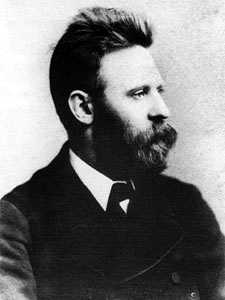|
Nikolai Avksentiev
Nikolai Dimitrovich Avksentyev (russian: Николай Дмитриевич Авксентьев; 28 November 1878, Penza – 24 March 1943, New York City) was a leading member of the Socialist-Revolutionary Party (PSR). He was one of the 'Heidelberg SRs' (a group of Russian students at the University of Heidelberg in the 1890s), like Vladimir Zenzinov. These SRs were influenced by neo-Kantian philosophy and Marxism. As Chairman of the Provisional All-Russian Government, he headed the Russian state from September 23 to November 18, 1918. He was overthrown and arrested by the Minister of War, Alexander Kolchak, who proclaimed himself the Supreme ruler of Russia. Biography Born into the Russian nobility, Nikolai Avksentiev attended school in Penza, studied at the Law Faculty of Moscow University (in 1899 he was expelled due to student unrest). He was a founder and the first chairman of the Party of Socialist Revolutionaries, and during the 1905 Russian revolution was elected ... [...More Info...] [...Related Items...] OR: [Wikipedia] [Google] [Baidu] |
Provisional All-Russian Government
The Provisional All-Russian Government (PA-RG), informally known as The Directory, The Ufa Directory, or The Omsk Directory, was a short-lived government during the Russian Civil War, formed on 23 September 1918 at the State Conference in Ufa as a result of a forced and extremely unstable compromise of various anti-Communist forces in eastern Russia. It was dissolved two months later after the coup, which had brought Admiral Alexander Kolchak to power in Communist-free areas of eastern Russia. The Government was formed from the ''Committee of Members of the Constituent Assembly'' (mainly SR and KD members based in Samara) and from the '' Provisional Siberian Government'' (consisted mainly of regional politicians and rightist officers and based in Omsk). The two régimes had previously failed to work effectively together, with rivalry leading to a customs war and to numerous border disputes. Formation A State Conference took place at Ufa between 8 and 23 September 1918, wh ... [...More Info...] [...Related Items...] OR: [Wikipedia] [Google] [Baidu] |
Neo-Kantianism
In late modern continental philosophy, neo-Kantianism (german: Neukantianismus) was a revival of the 18th-century philosophy of Immanuel Kant. The Neo-Kantians sought to develop and clarify Kant's theories, particularly his concept of the "thing-in-itself" and his moral philosophy. It was influenced by Arthur Schopenhauer's critique of the Kantian philosophy in his work ''The World as Will and Representation'' (1818), as well as by other post-Kantian philosophers such as Jakob Friedrich Fries and Johann Friedrich Herbart. Origins The "back to Kant" movement began in the 1860s, as a reaction to the German materialist controversy in the 1850s. In addition to the work of Hermann von Helmholtz and Eduard Zeller, early fruits of the movement were Kuno Fischer's works on Kant and Friedrich Albert Lange's ''History of Materialism'' (''Geschichte des Materialismus'', 1873–75), the latter of which argued that transcendental idealism superseded the historic struggle between materia ... [...More Info...] [...Related Items...] OR: [Wikipedia] [Google] [Baidu] |
Propaganda By The Deed
Propaganda of the deed (or propaganda by the deed, from the French ) is specific political direct action meant to be exemplary to others and serve as a catalyst for revolution. It is primarily associated with acts of violence perpetrated by proponents of insurrectionary anarchism in the late 19th and early 20th century, including bombings and assassinations aimed at the ruling class, but also had non-violent applications. These deeds were intended to ignite the "spirit of revolt" in the people by demonstrating the state was not omnipotent and by offering hope to the downtrodden, and also to expand support for anarchist movements as the state grew more repressive in its response. In 1881, the International Anarchist Congress of London gave the tactic its approval. Anarchist origins Various definitions One of the first individuals to conceptualise propaganda by the deed was the Italian revolutionary Carlo Pisacane (1818–1857), who wrote in his "Political Testament" (1857) th ... [...More Info...] [...Related Items...] OR: [Wikipedia] [Google] [Baidu] |
